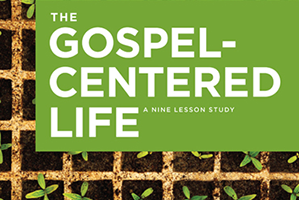Processing the Gospel
My small group just began the 9-week study "The Gospel-Centered Life" by World Harvest Mission. I've gone through the 36 week version of this study (Gospel Transformation) twice, once as a learner and once as the teacher. I've also taught another small version of it called "Living in Light of the Gospel Story." These are some of my favorite studies, as well as some of the best reformed explanations of the gospel I’ve ever encountered without ignoring one great aspect of the person: the heart. All too often, reformed theology shoots for the head and forgets that we are holistic people. These studies balance both in a great way.
There were some tears during the first lesson, as one group member was recounting a painful experience she had in the church many years ago that has since stunted her growth in the Lord. When I asked her if she’s had the chance to really grieve it, she said she said. She said many many tears were shed over the experience.
I’m not a “fix-it” kind of small group leader… I prefer to guide the discussion, but help people get there themselves. So I wasn’t going to go into counseling mode. But I did say this “Sometimes we can grieve something without really processing it. So maybe this study can help you process the experience and we, as your small group, can support you in that.” Now, as a teacher, I regularly say stuff without realizing exactly what I’ve said. I’m sure some of it is the Holy Spirit and some of it is just me spouting off. But one of the other groups members needed to sit in that for a while. “Dang. That’s true. You really can grieve something without really processing it. What made you say it that way?” he asked.
“Therapy,” was my quick and dirty answer. See, once upon a time I was the processor and not the griever. I would analyze, pick apart, grow through the experience... all without ever grieving what I lost because of it. This woman was doing the opposite. And this was preventing her from moving forward in a number of ways, including in her spiritual maturity. Since the experience involved a bible study were she was the leader, the idea of doing more bible study (in the same way) was unthinkable to her. I’ve watched her, in the last 10 months, be emotionally removed from the conversation and from the previous studies, each time we met. But the questions asked in lesson one of “The Gospel-Centered Life” forced her out of that. She was finally letting the gospel process her.
This, ladies and gentlemen, is why I do what I do. This is why I pursue discipleship and education in the church. This is why I love getting to teach people in all seasons of life, all in different places in their walk with Christ. I do it because I get to see the joy and the pain of God working in someone’s heart. I get to see the gospel process someone’s heart. And I get to let it process mine, too. I can’t think of anything cooler.



Comments